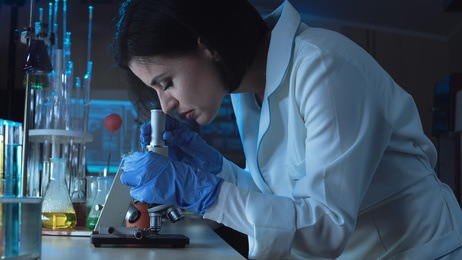UAMS awarded $1.86 million grant for radiation oncology
by May 6, 2020 12:38 pm 541 views

A five-year grant of more than $1.86 million from the National Cancer Institute (NCI) to the University of Arkansas for Medical Sciences (UAMS) will fund research aimed at reducing long-term neurological damage caused by a common cancer treatment regimen.
UAMS announced the grant on Wednesday (May 6).
Fen Xia, M.D., Ph.D., professor and chair of the Department of Radiation Oncology at the University of Arkansas for Medical Sciences (UAMS), received the grant for her project titled “The Novel Role of Sirtuin 2 in Regulation of Transcription-Associated DNA Damage Repair.”
“Platinum-based chemotherapy is commonly used alongside radiation therapy to treat several types of cancer. However, this treatment combination can cause permanent neurological damage, which presents a daunting challenge when treating cancer patients,” said Xia, who specializes in tumors of the central nervous system.
Platinum-based drugs have the chemical element platinum as part of their molecular structure. Irradiation and/or platinum-based chemotherapy is commonly used to treat head and neck cancers, ovarian cancer, cervical cancer, and colon and rectal cancer, among others. Head and neck cancers can include tumors in the mouth, nose, throat, sinuses and other areas in the head and neck.
Nerve damage caused by radiation and/or chemotherapy can include irreversible weakness, numbness and pain in the hands and feet, known as peripheral neuropathy.
Xia’s research examines possible ways to alleviate or prevent this damage from occurring, while maintaining the therapy’s effectiveness and improving the patients’ quality of life.
“We don’t fully understand the reason why some patients experience neurological damage due to this combination of cancer therapies, and, unfortunately, we lack drugs that selectively protect neuron survival without compromising their cancer-fighting ability,” said Xia, who also serves as director of the UAMS Radiation Oncology Residency Program.
Her preliminary study discovered a connection between the function of the protein Sirtuin 2 (SIRT2) with repair of DNA damage caused by radiation and/or platinum-based chemotherapy. SIRT2 is involved in diverse cellular processes including metabolism, response to oxidative stress and tumor suppression.
“Our research goal is to better understand the biological role of SIRT2 and the molecular mechanisms that regulate the repair of damaged DNA caused by radiation and/or chemotherapy. If we can determine the different connection between DNA repair in cancer cells’ growth and normal neuronal cells’ survival, we may be able to find new ways to treat cancer and to spare patients from treatment-caused toxicity,” Xia said.
She expects the study to lay the foundation for future research investigating novel strategies to alleviate and/or prevent neurotoxicity in cancer patients who need radiation and chemotherapy.
